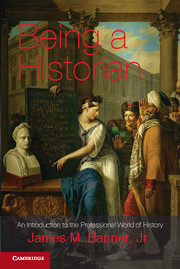Book contents
- Frontmatter
- Contents
- Preface
- Acknowledgments
- 1 The Discipline and Professions of History
- 2 The Structure of the Discipline of History
- 3 A Multitude of Opportunities
- 4 The Academic Trinity
- 5 History outside the Academy
- 6 Teaching and Writing History
- 7 Professional Principles, Responsibilities, Rights
- 8 Being Oneself as Historian
- Index
- References
2 - The Structure of the Discipline of History
Published online by Cambridge University Press: 05 June 2012
- Frontmatter
- Contents
- Preface
- Acknowledgments
- 1 The Discipline and Professions of History
- 2 The Structure of the Discipline of History
- 3 A Multitude of Opportunities
- 4 The Academic Trinity
- 5 History outside the Academy
- 6 Teaching and Writing History
- 7 Professional Principles, Responsibilities, Rights
- 8 Being Oneself as Historian
- Index
- References
Summary
Like much else in the world, the discipline of history has taken the sedimented form of the times in which its major institutions and practices came into being. How it functions now is the result not of decisions made yesterday but of long-ago events, decisions, and actions whose full significance could not be foreseen and whose layered consequences continue to be many and diverse. We live with those consequences in the structure and ways of a discipline grown increasingly complex. Yet while historians are likely to function best and to make choices consonant with their interests and skills when they understand the discipline's organization in relation to the sequence of its development and when they can locate themselves in its present configuration, there exists not even an introduction to the structure of history in the United States. I know of no work that explores how the discipline is shaped, why it came to have the organizational structure it does, what problems arise from its current form, and what might be done about them. As a result, historians typically enter on their careers without understanding how the discipline's institutional structure affects their ways and with a kind of easy acceptance of the discipline's given shape and practices. When they then gradually accumulate an understanding of their particular worlds of work and develop critical postures toward them, they often do so without seeing the discipline whole or engaging themselves with its totality. This chapter tries to present an outline of that whole discipline, especially of its institutional structure and operations. But because it is the first such attempt, and an attempt made in the absence of a substantial literature, it is a sketch only, intended more as an orientation to its subject rather than as a full exploration of it.
It would be easy enough to assume that the institutional origins of history in the United States were to be found in the colonial colleges. But that assumption would be wrong. Well into the nineteenth century the early colleges’ curricula, which were centered on philosophy, classical languages, and mathematics and almost entirely prescribed, made no room, except for some ancient history and exemplary lessons drawn from the past, for history as an independent subject.
Information
- Type
- Chapter
- Information
- Being a HistorianAn Introduction to the Professional World of History, pp. 34 - 62Publisher: Cambridge University PressPrint publication year: 2012
